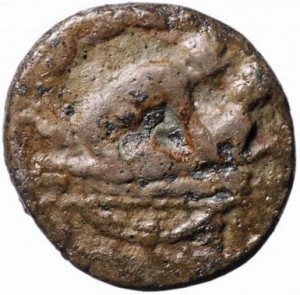Regis Cursan, the pastry chef at London’s Nobu restaurant, was scanning the mud of the Thames bank near Putney bridge with his metal detector what he found a small bronze Roman coin. When he rubbed some of muck off, he saw the Roman numeral XIIII on one side and a figure on the other side that he at first thought was a goddess but turned out to be a couple having sex. It was not a coin after all, but rather a spintria, a 1st century token common in the Roman world which some experts believe was used to pay for the services of a prostitute.
 This is the first one ever found in Britain which makes it an exciting discovery. Cursan has donated the token to the Museum of London, where it is currently on display.
This is the first one ever found in Britain which makes it an exciting discovery. Cursan has donated the token to the Museum of London, where it is currently on display.
“This is the perfect archaelogical object. It’s sexy and provocative in the best sense of the word,” said Caroline McDonald, museum curator.
“The lot of a Roman sex slave was not a happy one and objects like this can help the Museum of London provoke debates about issues that are relevant to the modern city and its visitors. Museums should engage with these more grown-up and sometimes less comfortable topics.”
Nice segue from titillated glee to somber reflection on the plight of sex slavery.
The thing is, we don’t know what those tokens bought exactly. The articles about this discovery lean heavily on the brothel token theory, that the numeral on the back represents a price paid maybe even for the specific act depicted on the front. That would be convenient in a mobile, multi-cultural, polyglot empire where prostitutes were slaves who could have come from anywhere and their clients from somewhere else entirely. No need to negotiate price or explain what you want in words; just buy the apposite token and exchange for services.
There could have been a scarier reason for the rise and fall of spintriae. Most of the ones discovered date to the reign of Tiberius. Suetonius says Tiberius was an avid prosecutor of laesa maiestas (literally “injured majesty,” called lese majesty in English after the French) cases. Crimes against the imperial dignity included carrying “a ring or coin stamped with his image into a privy or a brothel” so, the argument goes, a token brothel/toilet economy sprang up under Tiberius to save johns’ necks.
The problem with the brothel theory is that no ancient sources mention the existence of spintriae, and none of them have been found in any actual brothels. Pompeii, for instance, had one official brothel and an estimated 25 smaller ones operating from first floor flats above taverns and private homes. Plenty of spintriae have been found around town, none of them in the brothels.
Romans included explicitly erotic imagery in their daily lives. There are frescoes of people having varied and active sex in the baths at Pompeii. Mighty erect phalluses are everywhere, warding off bad luck. The spintriae could have been used as gambling chips, board game tokens, claim check tokens at the baths, at religious festivals (it’s no weirder than Mardi Gras beads, if you think about it) or handed out as naughty gift items. Martial describes showers of “lasciva numismata” (lascivious coins) raining down on the crowds at Domitian’s triumphal games (Epigrams, Book VIII:LXXVIII).
The least lisivious thought I have about the spintriae is that they are something of a gag gift. I remember as a little bort a number of things floating around the home or my mom’s office that were entirely inappropriate for my eyes. One of my favorite pieces was a plate with a picture of two overweight paramours. The caption was something like “Okay, how is this supposed to work?” But knowing history and maybe Romans as well as I do (meaning: not at all, really) it’s probably something stranger and less innocent.
http://en.wikipedia.org/wiki/File:Roman_Roads_in_Britannia.svg, the ‘Portway’ coming from ‘Calleva Atrebatum’ (Silchester).
Apparently, these were jetons: “… apart from the sanitation, the medicine, education, viniculture, public order, irrigation, roads, the fresh-water system, and public health, what have the Romans ever done for us?”
There might have been a shortcut at Putney and plenty of time till the bridge was erected: http://www.youtube.com/watch?v=lMEBLLkIa9E (John Playford – Putney Ferry)
So very interesting
Laney
Hi Laney! 🙂
late afternoon yesterday i came around some kind of coin metal detecting it was around 8ins deep, it is silver i believe, on the back you can just make it out a sword inside a shield some kind, can anyone help me and tell me what it is thank you 077720372336.
sorry its 07772037236
my number again 07772037236 thanks again
Wow..Never heard anything about it. Thanks for the article!
A very informative post!
From one article about a Roman token found in the Thames at London by a pastry cook to a much later, but equally as interesting token. This one was issued by a pastry cook from mid-17th century London and found in the Thames at Gravesend in Kent.
http://pepyssmallchange.wordpress.com/2013/12/30/the-pastry-cook-at-the-sign-of-the-crown-in-shoe-lane/
Hope you enjoy this one also.
Antiquarian